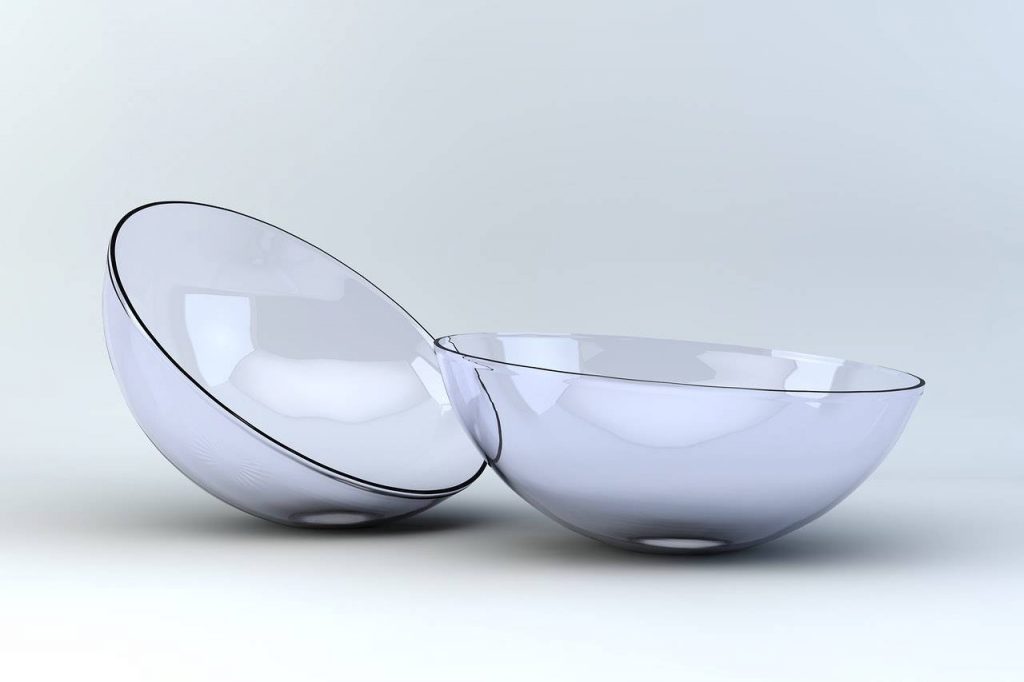Contact Lenses
Contact lenses can be a great part of the overall plan for achieving your best possible vision. They are a comfortable and convenient option for patients who don’t want to wear prescription glasses all the time. Read on to see how they could help you.
What is a contact lens?
A contact lens is a super thin, curved plastic disc placed on the surface of your eye. While naturally clear, they are often given the slightest tinge of colour to make them easier to see when you are handling them. They can be used to treat a range of vision problems including:
- distance vision (myopia, or short sightedness, astigmatism)
- reading (hyperopia, or long sightedness)
- therapeutic treatment programs (Ortho-K, keratoconus)

Soft vS. hard
Most people wear ‘soft’ contact lenses, which are very flexible and squishy because of their high water content. This is what makes them so comfortable and easy to wear. They can be worn on a full-time or part-time basis. Daily disposable soft contact lenses are worn throughout the day then tossed before bed and replaced by a fresh pair in the morning. Other soft lenses have different replacement schedules (eg. fortnightly, monthly).
Rigid gas permeable lenses, or ‘hard’ lenses, are less often prescribed – often to address an underlying structural eye condition such as keratoconus. Ortho-K treatment for corneal reshaping also requires this type of lens.
Your optometrist Andrew Greer will prescribe the most appropriate type of lens for you.
How should I use them?
How you use them depends on your vision needs and your lifestyle. Some contact lens patients are committed daily wearers, while other patients choose to use them on a needs basis, perhaps for specific work, sporting, recreational or special occasions.
You will still need prescription glasses, but you might only wear them, say, in the evenings if your eyes are tired, or if you need to get up in the middle of the night!
If you wear contact lenses then you need sunglasses when you’re outside. This is vital to the health of your eyes and the quality of your long term vision. We offer a special 20% discount on sunglasses to our contact lens patients – view offer.
Learn about our recycling program for contact lenses and packaging.
Contact lenses: the easygoing alternative to
Reading glasses
An alternative to reading glasses
In your 40’s and starting to need reading glasses? Presbyopia, or age-related long sightedness, is part of the normal vision changes we all experience as we age. It is caused by a natural hardening of the eye lens, so that by the early 40’s it does not respond as well to the muscles intended to change the focus of the eye. Contact lenses can be prescribed as an alternative to reading glasses.
The onset of age-related long sightedness can be particularly frustrating if you already wear contact lenses for distance and want to continue seeing clearly up close without adding reading glasses.
A great option to try is monovision, which requires wearing one contact lens that corrects only distance vision in one eye, and wearing another lens that corrects only near vision in the other eye. Your brain is smart and both eyes still work together, allowing you to see clearly at any distance without you even giving it a thought.
If your distance vision remains good then with monovision you might only need to wear a contact lens in one eye instead of wearing reading glasses. That’s a very simple solution to never losing your reading glasses again!
Multifocal contact lenses are also available.

Monovision corrects for distance vision in one eye and near vision in the other eye.
Tips for safe wearing
Follow the instructions given by your optometrist. This is important because even common complications such as infection and inflammation might lead to vision loss or blindness.
- Hygiene is essential! Wash your hands before you put your contact lenses in and before you taken them out.
- Keep your contact lenses well cared for and clean (unless you’re using daily disposables – they just go straight into the bin)
- Stick to your wear and replacement schedule. If you use a monthly lens, make sure you pop open the fresh pair every month. Don’t re-use a daily disposable.
- Long term contact lens wearers – don’t get too casual with your lens safety. Just because you’ve been sticking them in your eyes for 30 years doesn’t make you immune to infection.
- Regular after care checks are necessary to monitor your eye health and your vision.
The right choice for you?
Whatever your lifestyle and preferences, your optometrist Andrew Greer will find the right contact lenses and eye care solutions for you. Book a Contact Lens Consultation to discuss introducing contact lenses into your routine – book an appointment online or contact us on 02 6766 2544.

